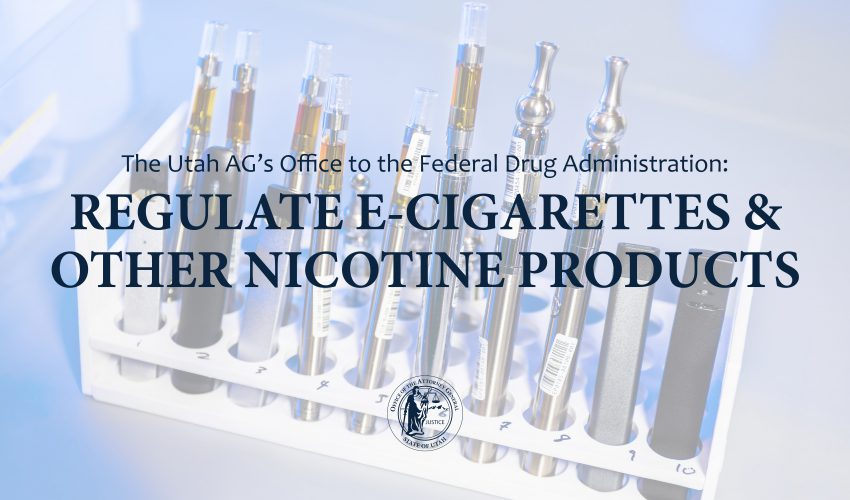SALT LAKE CITY – Today, Utah Attorney General Sean D. Reyes today joined a bipartisan coalition of 31 states and territories in urging the U.S. Food and Drug Administration (FDA) to halt the surge of youth nicotine addiction by enacting restrictions on tobacco products that disproportionately harm youth. Specifically, the coalition is calling on the FDA to use its regulatory power to eliminate youth-appealing flavors, limit nicotine levels in e-cigarette and oral nicotine products such as pouches, gum, and lozenges, and restrict marketing for these products. The FDA is responsible for deciding whether to allow the products to stay on the market through the Premarket Tobacco Product Applications (PMTAs) filed for each product, and these proposed measures would deny approval for any product that would worsen America’s youth nicotine epidemic.
READ A COPY OF THE LETTER HERE
“E-cigarettes have a reputation of being ‘harmless’ compared to traditional cigarettes. They’re not,” said Utah Solicitor General Melissa Holyoak. “The reality is that young people’s lungs can be severely damaged by these products. In the last decade, Utah has seen a drastic increase in use among youth and young adults. Because the candy and fruit flavors of these products make them easy to like, eliminating those flavors can prevent our youth from creating a lifelong unhealthy habit.”
E-cigarette use among high school students increased dramatically, from just 1.5 percent in 2011 to 11.7 percent in 2017, and then to 27.5 percent in 2019. Data from 2020 shows that 19.6 percent of high school students have used an e-cigarette in the past 30 days, with 38.9 percent of those reporting e-cigarette use on 20 or more days of the past 30 days, and 22.5 percent reporting daily use. Additionally, oral nicotine products (most notably pouches) are quickly becoming the fastest-growing nicotine category in convenience stores, growing by about 500 percent. It is estimated that 13 percent of those between 15-24 years old used oral nicotine products in the past 30 days.
E-cigarettes and oral nicotine products have not received marketing authorization from the FDA, as required by federal law. Companies like JUUL have been vigorously marketing flavored nicotine products, largely free from regulatory supervision, leading to what former U.S. Surgeon General Jerome Adams characterized as a “youth nicotine epidemic.” In their letter to the FDA, the coalition argues that the FDA must address the epidemic by Imposing restrictions and age verification on all traditional and digital marketing campaigns targeting young people.
Additionally, the coalition maintains that the FDA should limit the amount of nicotine in e-cigarette and oral nicotine products, which are at their highest levels to date. Nicotine has particularly harmful effects on the developing brain, with youth being significantly more likely to become addicted than adults. High youth nicotine consumption is also associated with numerous adverse physical outcomes, like nicotine poisoning and toxicity. Nicotine has also been tied to mental health and behavioral problems like major depressive disorder, academic problems, and addiction to other substances.
Finally, the coalition argues that banning candy, mint, fruit, and menthol flavors, is essential to eliminating the appeal of the products to youth consumers. More than 80 percent of youth using e-cigarettes choose non-tobacco-flavors. Though the FDA announced that it would prioritize its enforcement against flavored cartridge-based e-cigarettes (except menthol and tobacco flavors), menthol-flavored e-cigarette sales jumped 54.5 percent in market share over the four weeks following the FDA’s April 2020 guidance, and 82.8 percent over eight weeks, indicating its popularity among youth.
The FDA is expected to decide whether e-cigarettes and oral nicotine products should be allowed to remain on the market starting on Sept. 9, 2021. The coalition urges the FDA to deny all PMTAs for products containing high levels of nicotine, and for products containing menthol or other flavors.
Attorney General Reyes joined today’s coalition led by the attorneys general of Idaho, Illinois, Nebraska, New York, North Carolina, and Tennessee. Other members of the bipartisan coalition include the attorney generals of Alaska, Arkansas, California, Colorado, Connecticut, Delaware, the District of Columbia, Guam, Maine, Maryland, Massachusetts, Michigan, Minnesota, Nevada, New Hampshire, New Jersey, New Mexico, Oregon, Pennsylvania, Puerto Rico, Rhode Island, Vermont, Washington, and Wisconsin.
While the coalition of Attorneys General has urged the FDA to implement industry-wide proposals, they recognize that the youth nicotine epidemic is a substantial problem. Many of the coalition have already used their own independent authority under state law to combat the companies who have helped fuel this epidemic and may continue to seek further relief as appropriate against companies that violate our state laws.
###

